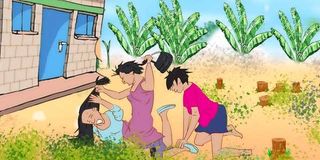Day Rasto made our house girl leave without saying bye

Within seconds, Rasto had rescued Perepetua from the wrath of his two wives
You all know Rasto. Rasto is one of the known eminent persons of Mwisho wa Lami. When we were in primary school, Rasto, the father of my cousin Kizito and a distant cousin to my father Caleb, was working for Kenya Railways in Nakuru, which we all called Naikuru.
We really admired his family.
Unlike us who seemed to have been planted in the village, Rasto’s children would visit him in Nakuru every school holiday, and come back with fancy hair styles, new clothes, and some sheng.
With my father working as a messenger at the DO’s office and my mother a cook at St Theresa’s Girls School, the farthest we ever went was to visit Senje Albina.
When he retired around 2006, Rasto was the talk of town, sorry, village. He put up a large semi-permanent house in the village; and using the money he had been paid, he started a photocopy business in Mwisho wa Lami market. We would go to his home to watch football – he had a black and white Greatwall, and solar- powered battery.
Cosmas Bar
Rasto could never drink at Hitler’s, or at Cosmas Bar. He used to go to Luanda for a drink, at Big Ben. “The beer at Cosmos Bar is tasteless because it is stale,” he would say, then board Msamaria Mwema to Luanda. And he used to buy newspapers every day.
“The beer in Luanda and the beer at Cosmas has no difference,” he would later tell me, just four months after returning to the village, when I met him at Cosmos Bar and Rest. “Big Ben is just stealing from us” At the time, he would not touch Hitler’s stuff. He called it poison, and wondered who, in their right mind, would take poison. “I came back here to enjoy my retirement, not to die,” he told me when I asked him to try out Hitler’s stuff.
Even then, Rasto was still using boda boda to take him to Cosmos Bar. So, when a few months later I found him walking to Mwisho wa Lami market, I was surprised. “It is good to exercise Andre,” he told me, saying a doctor friend had advised him that at this age, one needs to walk a lot to avoid getting arthritis. I also noted that his shoes were not polished, and his once clean clothes were dirty.
It wasn’t long before Rasto made his arrival at Hitler’s, where we warmly welcomed him. “I had homa last week and someone asked me to try Hitler’s stuff, and the homa disappeared instantly” he said. Later on, he would say: “I have wasted lot of money on beer and other expensive drinks, yet Hitler’s stuff is not only affordable, but it is pure and nutritious.”
Within a year, Rasto had closed his business and become a real villager. He visited and welcomed village visitors, something he would never have done a year earlier! He was no longer buying newspapers.
Chief negotiator
Thanks to his ability to connect with other old men who had lived in towns, Rasto became the chief negotiator for Mwisho wa Lami in all matters – funerals, dowry payments and marriage disputes.
But why am I talking a lot about Rasto? Because of what happened last week. As you know, he had been the leading negotiator for all our family dowry matters, but I dropped him when I suspected that in my cases, he could play football on Fiolina’s family side. Upset, Rasto visited me twice to try to convince me to reconsider my position as he stood to lose whatever little he collected after such events. But I stood my ground.
“I have made up my mind, papa,” I said as Perepetua served us breakfast. Perepetua is the old woman Fiolina brought home to be our house girl. As you know, Fiolina is in Kakamega with Electina and Sospeter; having left Honda, Branton and I to eat village life.
Rasto picked a conversation with Perepetua, and it turned out that he knew her brother, who was a neighbour in Nakuru. He really praised her tea. Rasto would come again the next day, trying to convince me, unsuccessfully.
Three days after we visited Fiolina’s village, Rasto came over in the evening. Perepetua had cooked brown ugali and chicken. Rasto was over the moon and he kept praising her.
Later, Perepetua made us tea and left to go sleep in the kitchen, which is adjacent to our house. Rasto and I enjoyed the tea as we continued talking. It was well past 10pm when I saw off Rasto.
However, I was woken up at 6am by a commotion. Rasto’s two wives were knocking on my door looking for him.
“Alitoka jana usiku,” I told them.
“Na si mara ya kwanza amelala hapa,” the second wife said, telling me to explain why Rasto was sleeping in my home. I got confused. Perepetua was preparing breakfast.
“Utawachana na bwana wetu!” The second wife shouted at Perepetua, “Ama utarudi kule ulitoka.”
“Nini mbaya na nyinyi?” Perepetua answered rudely “Wanawake wawili hamjui kulinda bwana na mnapiga kelele,” she said as she walked to the kitchen. I can’t remember what happened, but next, Rasto’s wives had descended on Perpetua with kicks and blows.
“Rasto! Rasto! Darling!” Shouted Perepetua.
Rasto came out of my kitchen, only wearing a torn vest and kaptula, brandishing his bakora. “Nitaua mtu leo!” He shouted. Within seconds, he had rescued Perepetua from the wrath of his two wives. Seeing an opportunity, Perepetua ran away to safety. Rather than apologise, Rasto admonished his wives and ordered them to go back home. He went back to my kitchen, dressed up, and bid us goodbye. And just like that we do not have a house girl.





